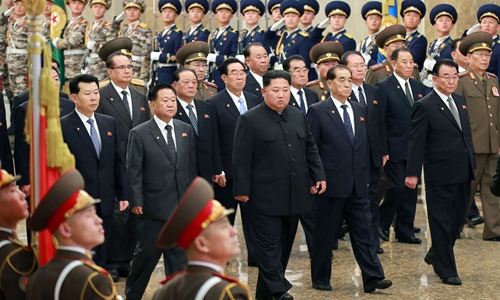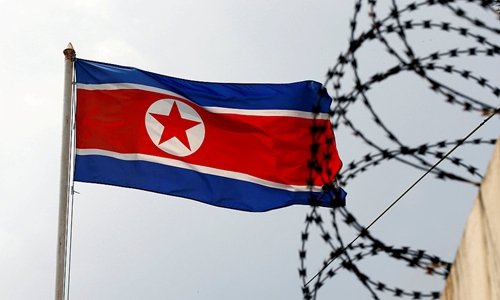HOME >> CHINA
China, Russia urge easing of UN sanctions on North Korea
By Zhang Han Source:Global Times Published: 2019/12/17 23:33:40
US stance of complete denuclearization as prerequisite too rigid: analysts

North Korean leader Kim Jong-un (center) visits the Kumsusan Palace of the Sun in Pyongyang, North Korea on Tuesday to commemorate the eighth anniversary of the death of his father, former North Korean leader Kim Jong-il. Photo: AFP
China and Russia have proposed the UN Security Council lift some sanctions on North Korea, which Chinese analysts view as a responsible attitude to help resume talks between North Korea and the US and achieve ultimate denuclearization of the Korean Peninsula in a flexible manner.The proposal urged North Korea and the US to continue talks and called for a resumption of the six-party talks to facilitate a peaceful and comprehensive solution to the Korean issue through dialogue, China's Ministry of Foreign Affairs said on Tuesday.
"We encourage the two sides to respect each others' concerns, show their sincerity and flexibility and implement the agreements of the Singapore summit to break the standstill," Geng Shuang, ministry spokesperson, said at a routine press conference on Tuesday.
Chinese analysts underlined that the move showed China, a permanent member of UN Security Council, takes a responsible attitude toward regional stability and is flexible in mediating between concerned parties amid stalled talks.
Zhan Debin, director of the Center for Korean Peninsula Studies at Shanghai University of International Business and Economics, told the Global Times on Tuesday that the US setting complete denuclearization of North Korea as a prerequisite for easing sanctions was too rigid and "did not help solve the problem."
Considering Pyongyang had demonstrated its sincerity by demolishing nuclear test sites and reducing missile tests, it was practical to partly remove the sanctions, Zhan said.
Lü Chao, a research fellow at the Liaoning Academy of Social Sciences, told the Global Times that lifting some sanctions would be an effective impetus for North Korea to continue abiding by the UN resolutions.
The move was reasonable as items suggested to be exempted from sanctions were not about the military or heavy industry but related to humanitarian and livelihood issues, crucial relief channels for common people, Lü said.
The draft resolution suggested removal of a ban on North Korea exporting statues, seafood and textiles. It also called for eliminating the ban on North Korean people working abroad and for terminating a measure requiring North Koreans working overseas return home by December 22, according to media reports.
Textiles were North Korea's second-biggest export after coal and other minerals in 2016, totaling $752 million, according to data from the Korea Trade-Investment Promotion Agency (KOTRA). Wages of workers are an important source of foreign currency for the country.
The draft also argued that inter-Korean railway and road cooperation projects be exempted from sanctions.

Photo:VCG
Negotiations on the draft started Tuesday and the vote day was not decided, but Washington appeared cold to the proposal.
A US State Department official, who requested anonymity, was quoted by Reuters as saying "now was not the time" for sanctions relief while accusing Pyongyang of "threatening to conduct an escalated provocation, refusing to meet to discuss denuclearization."
A resolution needs nine votes in favor and no vetoes by the US, China, Russia, the United Kingdom and France to pass.
As the year-end deadline set by North Korean leader Kim Jong-un for negotiations with the US to resolve the peninsula nuclear standoff approaches, it was crucial that both sides show sincerity toward further talks, Zhan said.
Kim and US President Donald Trump in June held their third summit at the Demilitarized Zone (DMZ) in Panmunjom, which divides North and South Korea, after previous meetings in Singapore and Vietnam.
But it did not bring much practical achievements to bilateral denuclearization negotiations which hit a stalemate after the second meeting in Hanoi.
Working-level talks between the two countries broke down in Stockholm, Sweden, in October.
North Korea has been sending signals to the US through Kim's inspection tours, short-range missile tests and statements by senior state officials, but the US has reacted in a tough manner and ignored North Korea's core concern over economic sanctions, Zhan said.
Washington has been using sanctions as a bargaining chip to force Pyongyang to yield, he said.
The US and South Korea in August conducted a joint drill, which North Korea said violated the agreements reached in Singapore and Panmunjom.
The two countries postponed a planned military drill in November to show their goodwill after a fierce warning from North Korea.
North Korea announced it conducted what it described as "crucial" tests at the Sohae Satellite Launching Ground earlier this month, possibly a high-thrust engine or a long-range missile.
North Korea's actions should be seen as a "fight back" against the US hard-line approach and warnings of a "new path," which however may not be beneficial to Korean Peninsula denuclearization, Zhan said.
In his new year address for 2019, Kim warned he might take a "new path" if Washington maintains sanctions amid his country's push for economic development.
Posted in: DIPLOMACY